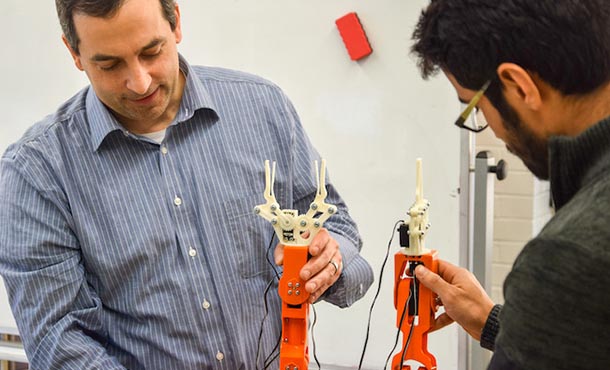
Alan Wagner, Hartz Family Career Development Assistant Professor of Aerospace Engineering, left, and Sagar Lakhmani, a Penn State electrical engineering and computer science graduate alumnus and shown here as a student in 2019, construct an emergency response robot to be used in Wagner's research on human-robot interactions. IMAGE: PENN STATE
Engineering professor receives NSF CAREER Award to advance robot ethics research
4/21/2021
By Tessa M. Pick
UNIVERSITY PARK, Pa. — Alan Wagner, Hartz Family Career Development Assistant Professor of Aerospace Engineering at Penn State, received a National Science Foundation (NSF) Faculty Early Career Development (CAREER) Award to support his research in human-robot interactions.
The NSF CAREER Awards are given to early-career faculty who have potential to serve as academic role models in research and education and lead advances in the mission of their department or organization, according to the NSF website.
“Receiving this award felt incredible,” Wagner said. “Earning an NSF CAREER Award has been a goal of mine since I was a graduate student. Support from Penn State has been critical for obtaining this award. I have received a great deal of support from my department head, Amy Pritchett. Without her support I do not think I could have won a CAREER Award.”
Wagner plans to use the funding from the NSF CAREER Award to further his team’s research on emergency response robots and understanding why and when people trust these robots to keep them safe during emergency evacuations of buildings or schools. Wagner’s research focuses on why people chose to follow the robots to uncrowded exits.
Wagner’s research has found that humans often trust robots and automation too much and situations can become unsafe in these cases. According to Wagner, humans have a natural tendency to see automated machines as more knowledgeable and less prone to error than they really are, so overtrust occurs when humans make these assumptions.
“An important issue with such an application, and many other applications, is will people trust the robot enough to follow it, but it’s also important to see if they will follow it even if it’s broken,” Wagner said. “This is called trust calibration.”
Wagner said that as robotic applications — such as automated driving and automated systems in health care — become more widely used, especially by a more inexperienced audience, there are increased risks for humans who trust robots even if they malfunction. He and his team plan to enhance user safety by creating robots that can recognize and help prevent people from overtrusting the robots.
“The central question for this research is how to create robots that assist people in correctly and accurately calibrating their trust in autonomous systems,” Wagner said.
By understanding the factors that cause overtrust, Wagner and his team plan to develop robots that adjust their behavior based on an individual’s emotional and physical response in an emergency — with the goal of effectively guiding them to safety.
Wagner also plans to use the award funds to promote educational and social aspects of his research. He said he will provide demonstrations of this team’s evacuation robots to school-age children, develop a robot ethics module for online learners and engage with the Discovery Space in State College to educate children on emergency response robots and how to respond in emergency situations.



